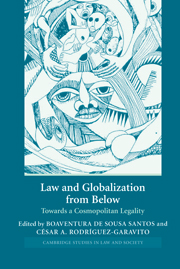Book contents
- Frontmatter
- Contents
- Notes on the contributors
- 1 Law, politics, and the subaltern in counter-hegemonic globalization
- PART ONE LAW AND THE CONSTRUCTION OF A GLOBAL ECONOMY OF SOLIDARITY
- 2 Beyond neoliberal governance: the World Social Forum as subaltern cosmopolitan politics and legality
- 3 Nike's law: the anti-sweatshop movement, transnational corporations, and the struggle over international labor rights in the Americas
- 4 Corporate social responsibility: a case of hegemony and counter-hegemony
- 5 Campaigning for life: building a new transnational solidarity in the face of HIV/AIDS and TRIPS
- 6 Negotiating informality within formality: land and housing in the Texas colonias
- 7 Local contact points at global divides: labor rights and immigrant rights as sites for cosmopolitan legality
- PART TWO TRANSNATIONAL SOCIAL MOVEMENTS AND THE RECONSTRUCTION OF HUMAN RIGHTS
- PART THREE LAW AND PARTICIPATORY DEMOCRACY: BETWEEN THE LOCAL AND THE GLOBAL
- Index
- References
4 - Corporate social responsibility: a case of hegemony and counter-hegemony
Published online by Cambridge University Press: 07 July 2009
- Frontmatter
- Contents
- Notes on the contributors
- 1 Law, politics, and the subaltern in counter-hegemonic globalization
- PART ONE LAW AND THE CONSTRUCTION OF A GLOBAL ECONOMY OF SOLIDARITY
- 2 Beyond neoliberal governance: the World Social Forum as subaltern cosmopolitan politics and legality
- 3 Nike's law: the anti-sweatshop movement, transnational corporations, and the struggle over international labor rights in the Americas
- 4 Corporate social responsibility: a case of hegemony and counter-hegemony
- 5 Campaigning for life: building a new transnational solidarity in the face of HIV/AIDS and TRIPS
- 6 Negotiating informality within formality: land and housing in the Texas colonias
- 7 Local contact points at global divides: labor rights and immigrant rights as sites for cosmopolitan legality
- PART TWO TRANSNATIONAL SOCIAL MOVEMENTS AND THE RECONSTRUCTION OF HUMAN RIGHTS
- PART THREE LAW AND PARTICIPATORY DEMOCRACY: BETWEEN THE LOCAL AND THE GLOBAL
- Index
- References
Summary
INTRODUCTION
One general observation is shared among scholars of the global political economy regardless of their disciplinary, analytic, or ideological inclinations. Namely, that corporate global rule is already here. Positive evidence abounds. Multinational corporations (MNCs) dominate the global economy, accounting for two-thirds of global trade in goods and services. Of the one hundred largest world economies, fifty-one are corporations. The top two hundred corporations generate 27.5 percent of the world gross domestic product and their combined annual revenues are greater than those of the 182 states that contain 80 percent of the world population. The combined sales of four of the largest corporations in the world exceed the gross domestic product of the whole of Africa (Chomsky 2002; Davidsson 2002; Ellwood 2002). Economic figures tell only part of the story. As a result of their vast wealth, MNCs have accumulated significant political and cultural powers as well. Economic globalization and trade liberalization have given them powers that match and often surpass that of national governments. In rich and poor countries alike, albeit in different ways, MNCs often enjoy decisive powers to shape public policy, to encourage or bar legislative measures, to promote or discourage social reforms, and to influence governmental action in key areas including employment, the environment, and social and civil rights.
As corporations emerge as global private authorities, and as governments undergo structural adjustments, “we are back to the independent realm of economic action as a major locus of political power” (Beck, Giddens, and Lash 1994).
- Type
- Chapter
- Information
- Law and Globalization from BelowTowards a Cosmopolitan Legality, pp. 92 - 117Publisher: Cambridge University PressPrint publication year: 2005
References
- 25
- Cited by

